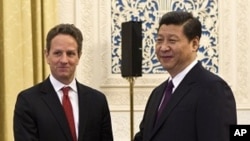U.S. Treasury Secretary Timothy Geithner is seeking China's support for new U.S. sanctions against Iran. The Chinese government says it is concerned about reports that Iran is enriching weapons-grade uranium, but is sticking to its position that dialogue, not sanctions, is the way to resolve the issue.
President Hu Jintao topped the list of Chinese officials who met in Beijing Wednesday with Geithner.
In another meeting, Vice President Xi Jinping, the man expected to be named later this year as Hu's successor, focused on strengthening Sino-American ties.
Xi says the visit will promote the bilateral relationship and economic ties into 2012.
Geithner says the main priority of his talks is economic growth and recovery in the United States and around the world. He also mentioned non-proliferation.
“We are looking forward to exploring opportunities to expand our exports to China and to strengthen and deepen our cooperation with China on a broad range of economic and strategic issues we face around the world,” Geithner said.
One issue China appears unwilling to go along with is recent U.S. sanctions that target Iran's oil industry. China is the top customer for Iranian crude.
Assistant Foreign Minister Zhai Jun says China firmly opposes nuclear proliferation. But he says Iran has signed the Nuclear Non-Proliferation Treaty, and so has the right to the peaceful use of nuclear energy.
He acknowledges there are “suspicions about the Iranian nuclear program,” but he adds that China believes these issues can only be resolved through dialogue and has been working toward that end.
Zhai says he hopes that dialogue and the resumption of formal international talks can lead to a proper and realistic solution.
Zhai went to Iran at the end of December for regular consultations. He returns to the Middle East Saturday, when he accompanies Chinese Premier Wen Jiabao on a three-nation trip to Saudi Arabia -- China's biggest foreign oil supplier - United Arab Emirates, and Qatar.
The official says deals will be signed, but he does not say whether China will be buying more oil from Saudi Arabia because, it is what he calls a commercial - not governmental - decision. Still, he says, with China's projected economic growth, the country will need more energy, “no matter where it comes from.”





